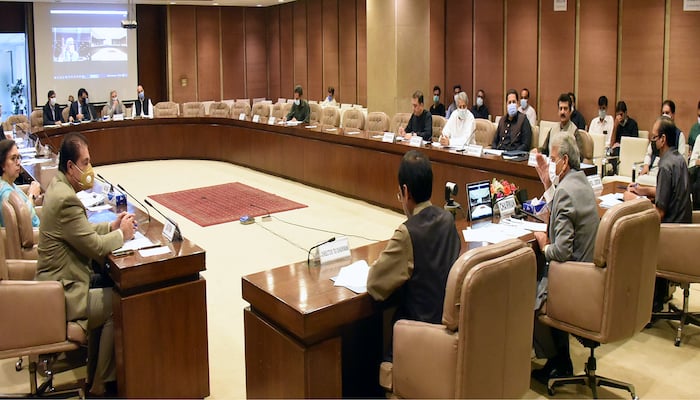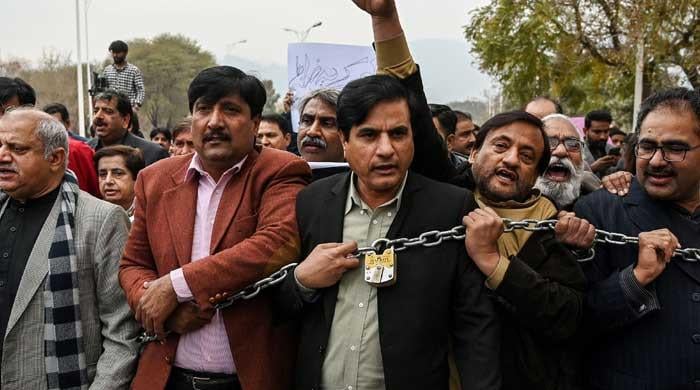Strengthening the Public Accounts Committees
It is essential for all political parties to seriously rethink, collaborate reconstructing structure of accountability framework, especially through strengthening PACs
September 15, 2021

The entire edifice of accountability through parliamentary oversight of the Public Accounts Committees (PACs) has crumbled owing to the serious shortcomings highlighted in my earlier article on this subject (‘Accountability reform’, Sep 10) , which has resulted in erosion of citizens' confidence in parliamentary democracy.
It is therefore essential for all political parties to seriously rethink and collaborate to reconstruct the structure of the accountability framework, especially through strengthening the PACs to ensure meaningful and effective oversight over the government’s operations, budgetary spending and adequacy of outcomes compared to funds spent for restoring public confidence.
In the ensuing paragraphs, I have narrated a ten-point agenda for reforming parliamentary oversight by enhancing the capacity, mandate, quality and processes of PACs, both at the federal and provincial levels. It is suggested that parliament should consider forming a bipartisan committee to consider these reforms that are necessary for establishing a credible system of accountability, which is essential for improving governance resulting in better outcomes for citizens in the future.
First, the role, responsibilities and composition of the PACs should be reviewed and redesigned based on a study of good practices in other Commonwealth jurisdictions, such as the UK, Australia and Canada, where significant improvements have been made over the years.
Second, PACs should be provided adequate budgets to engage necessary resources for building in-house capacity as well as engaging external experts / consultants with necessary technical knowledge on internal controls, risk management, audit, forensic investigations and use of technology. While parliament and provincial assemblies should provide necessary secretarial support and budgets, they should have the authority to obtain necessary resources from AGP, which has a substantial number of people and resources to support the PACs. In fact, providing necessary support should be part of the AGP’s primary responsibilities.
Third, the appointment of the AGP should be made by the president in consultation with the PAC. As per current constitutional provisions, the AGP is appointed effectively by the prime minister / federal cabinet (executive), as the president acts on the advice of the federal government, which compromises the independence of the AGP. In many jurisdictions, including the UK, Canada and Australia, the appointment of the auditor general is appointed in consultation with the PAC.
Fourth, the appointment of the AGP should be through a robust and transparent process. Hitherto, mostly serving or retired bureaucrats have been appointed as AGP; they had virtually no understanding, experience and skills of modern-day auditing. One of the most critical factors for improving the accountability system is the appointment of the right person as AGP, someone who has thorough knowledge of auditing standards, successful track record in professional judgement and experience of carrying out audits of large public and private-sector institutions, preferably of working in globally recognised audit firms, at market based remuneration.
Fifth, an appropriate amendment is required in the constitution to establish the AGP’s reporting relationship to the PAC/parliament. Under the current provisions of the 1973 constitution, the AGP once appointed by the president, can only be removed for misconduct by the Supreme Judicial Council (SJC), as is the case of superior court judges. Thus, effectively, the AGP is not accountable to any forum. In order to ensure quality and performance of audit function, it is essential that the AGP should be responsible for the quality of work and report to the PAC, which should also be empowered to evaluate performance and determine the remuneration of the AGP. The power of appointment and removal of the AGP should be with the PAC /parliament rather than the SJC, as there is absolutely no sense in making the AGP effectively responsible to none.
Sixth, the composition of the PACs needs major improvement. The members of the PAC should be carefully selected from the legislators, based on their knowledge and skills relevant to its work. Already, the PAC formed by the National Assembly includes a certain number of senators, so it has become a kind of joint committee, rather than just a standing committee of the National Assembly. While the practice of appointing leader of the opposition as chairperson is in line with good practices, it would be preferable if the criteria for this position were defined to include objectivity, appropriate knowledge and experience of audit, accounts and investigations, so that the right person from the opposition benches is selected as chair of the PAC, rather than only the leader of the opposition.
Seventh, there should be a requirement for a training and learning programme for all PAC members, whereby they must receive mandatory training in the areas of governance, accountability, public financial management, financial reporting and audit to enable them to carry out their role of oversight of the AGP, its reports and review the government’s accounts to enable them to perform their work in an efficient and effective manner.
Eight, there should be regular and periodic reporting by PACs, whereby they should submit quarterly reports containing the progress of their work, findings and recommendations based on their review of AGP reports on accounts and government operations for making necessary improvements in the internal controls, procedures and any corrective actions with respect to any irregularities identified. Federal and provincial governments should be required to provide their response on such findings and recommendations within two months and parliament should issue final directions on all such matters on quarterly basis.
Ninth, the PACs should ensure timely reviews and reporting, including completing the backlog of work and reporting in a year’s time, by engaging external consultants so that the backlog is cleared and PACs are able to carry out recent reports on which meaningful and timely actions can be taken. Further, a proper review of ten-year reports, preferably through an independent professional firm, can highlight all major deficiencies and internal control weaknesses, on which PACs /parliament should issue directives for necessary corrections, so that such matters do not recur.
Tenth, there is a need to make PACs statutory bodies through appropriate legislation in the federation and provinces to make them more effective and provide legal backing to their process, findings and recommendations to ensure compliance and implementation on a timely basis. At present, the AGP, who in a way reports to the PACs, is a constitutional position, but the PACs are constituted through rules of procedure of national and provincial Assemblies. This is a significant disconnect that needs to be corrected.
To conclude, let me reiterate that the aforementioned steps will result in PACs becoming more effective, leading to improvement in the accountability system. However, it is imperative to implement major reforms in the institutions of the AGP and CGA for the complete transformation of accountability as a key pillar of good governance.
The writer is a former managing partner of a leading professional services firm and has done extensive work on governance in the public and private sectors. He tweets @Asad_Ashah
Originally published in The News











